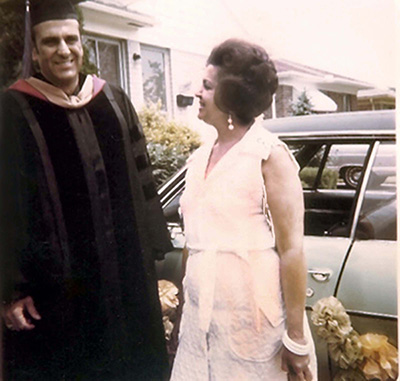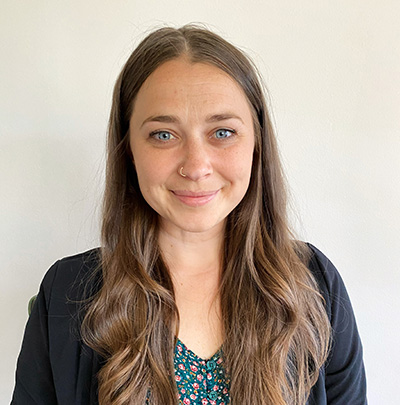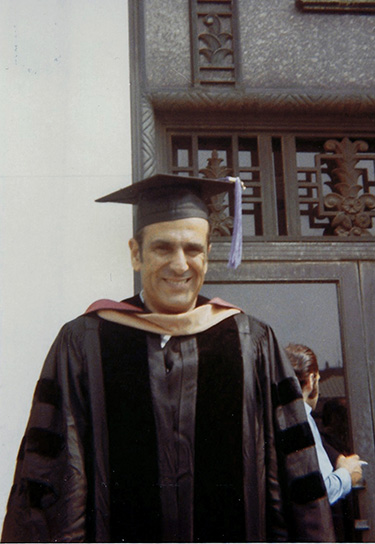A family's drive: Haddad siblings honor parents by supporting non-traditional law students
In June 1971, a green 1968 Chevy Impala decorated with yellow flowers arranged in the shape of the letters "WSU" left St. Clair Shores for Detroit's Rackham Memorial Building, where George J. Haddad was being awarded his juris doctor from Wayne Law at the age of 48.
Studying at Wayne State University in the early '70s was a family affair for the Haddads, as daughter Carol '72 (education) and son George '74 (mathematics) were pursuing bachelor's degrees while their father was in law school. The three commuted to Detroit together while mom Evelyn and youngest daughter Mary held down the fort at home, eager to hear tales about the workday.
As the Impala brought the family to the Law School Senior Convocation, its occupants beamed with pride. George had earned his J.D. while working as a full-time appellate officer for the IRS, completing a goal begun in the 1950s when he had enrolled in and then dropped out of law school to help Evelyn care for their growing family.

George's daughter Carol said his accomplishment might not have been possible without financial support.
"The chief of the appellate division at the time, William Reinhart, successfully lobbied to have the IRS sponsor Dad to attend Wayne Law," Carol said. "We realized we would love to give a scholarship because Dad had that help. Without it, he might not have been able to do it. He had a good job, but with three kids, it would have been difficult financially."
In remembrance of their parents, Carol, George and Mary (Haddad-Raveane) have established the George J. and Evelyn J. Haddad Endowed Scholarship. The siblings hope to provide the boost their father received by supporting students in Wayne Law's part-time evening program who have a gap of three or more years between completing undergraduate studies and enrolling in law school.
Inspired support
Mary said nontraditional students are "a group of people that probably don't have a lot that's geared toward them."
"It was so important to Dad that he did that at night," Mary added. "I felt strongly about it going to students in the part-time evening program because I knew how strongly he felt about having that opportunity."
Carol said that her father's continued pursuit of higher education helped inspire her to obtain a doctorate in higher and adult education.
"Dad was a real inspiration for my return to school, as he did so for five years, four nights a week," Carol said. "I taught courses to adults all my life, first extension courses in union halls, and then night and online courses to university graduate students for most of my career. With this scholarship, we wanted to give back to that cadre of students who go back for whatever reason."

The first recipient of the Haddad scholarship, Blythe Collins, is a part-time evening student attending Wayne Law ten years after receiving her undergraduate degree.
Collins said, "one of my favorite things about Wayne Law has been getting to know my fellow night students, many of whom have had years of experience in various fields."
"Our classes have been so interesting and engaging as each person has brought a unique and informed perspective to the table. It has been a joy to go through law school with this group, and it is an honor to receive a scholarship that supports non-traditional students."
Learning justice
Carol and George recalled that while attending Wayne State, they sometimes met their father to dine near campus. In addition to sharing a meal, they remember their dad passing on his advice and values during these times, some influenced by cases he was reading for class. Though she was younger, Mary recalls the same lessons.
"I was a child when Dad started law school, and then a preteen, so I remember him talking about those classic cases they study," Mary recalled. "My son Alexander is in law school now, and after his first year we talked about some of the cases, and I remembered them from Dad."
Education was important to the Haddad family, rivaled only by a commitment to issues of social and economic justice. Accordingly, scholarship applicants are asked to submit an essay describing their own commitment to these values.
"Our wish to support students committed to social and economic justice is consistent with the values with which we were raised," Carol said. "My parents' only grandchild carries those values forward with his focus on international human rights law."
A storied legal career
A willingness to return to school when some of his peers were considering retirement wasn't the only thing that set their father apart. The son of Syrian and Lebanese immigrants, Haddad was one of the first Arab Americans to work at the Detroit IRS office, where he handled many complex corporate, estate, gift and excise tax cases. Upon retiring from the IRS after 31 years in 1980, he began a 20-year career as a tax attorney for the firm Raymond & Dillon (later Raymond & Prokop).
His second career included serving as an expert witness in what became a well-known divorce case, Sands v. Sands (1993), where the defendant husband attempted to conceal assets of the marital estate from the plaintiff, his wife.

Carole Chiamp, the attorney representing Mrs. Sands, said, "George was invaluable. He came to court in his no-nonsense way and valued the assets as only he could do with his expertise. I believe his testimony went a long way toward convincing the judge that Mr. Sands was not a truth teller."
Although George had a variety of highly regarded professional achievements and was admired among his peers, his children emphasize that he remained humble with a great sense of humor. They said both parents were extremely generous as well.
Blossoms
In 1987, Evelyn Haddad wrote a note to her family, instructing them that if they were missing her after she passed, to "think of her with the first blossoms of spring."
The Haddad children said they often think of their mother and the way she supported her family.
Carol said her mother "was really proud of Dad and really didn't have the opportunity herself to go on to higher education, but she sure was sharp as a tack," and added that "both of our parents were ahead of their time in terms of gender roles."
"Mom supported Dad's law school attendance by managing the household, picking him up from campus at night, and engaging him intellectually as he discussed cases," Mary said.
Evelyn died in 2006. Her beloved husband followed in 2011.
The children of George J. and Evelyn Haddad invite friends, family and their fellow Wayne State alumni to contribute to the scholarship honoring their parents and providing support for unique and inspiring law students. To make a gift to the George J. and Evelyn J. Haddad Endowed Scholarship, please use our secure online giving page and type Haddad Endowed Scholarship into the "other designation or notes about gift" box. For additional ways to donate, see this page.